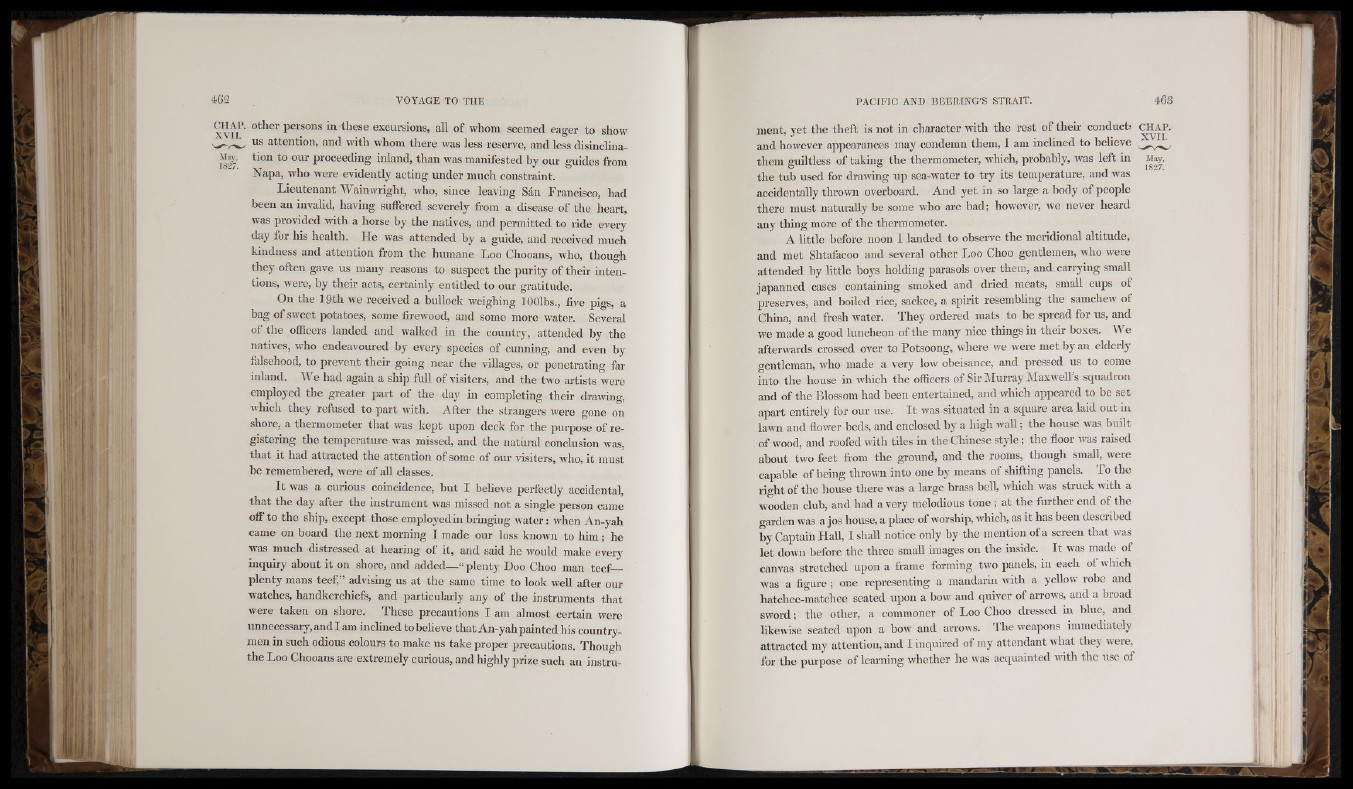
I , i
I' ' I
ill
C H A P . other persons in these excursions, all of whom seemed eager to show
M« ,
1827
us attention, and with whom there was less reserve, and less disinclination
to our proceeding inland, than was manifested by our guides from
Napa, who were evidently acting under much constraint.
Lieutenant Wainwright, who, since leaving Sán Francisco, had
been an invaUd, having suffered severely from a disease of the heart,
was provided with a horse by the natives, and permitted to ride every
day for his health. He was attended by a guide, and received much
kindness and attention from the humane Loo Chooans, who, though
they often gave us many reasons to suspect the purity of their intentions,
were, by their acts, certainly entitled to our gratitude.
On the 19th we received a bullock weighing lOOlbs., five pigs, a
bag of sweet potatoes, some firewood, and some more water. Several
of the officers landed and walked in the country, attended by the
natives, who endeavoured by every species of cunning, and even by
falsehood, to prevent their going near the villages, or penetrating fax-
inland. W e had again a ship full of visiters, and the two artists were
employed the greater part of the day in completing their drawing,
which they refused to part with. After the strangers were gone on
shore, a thermometer that was kept upon deck for the purpose of registering
the temperature was missed, and the natural conclusion was,
that it had attracted the attention of some of our visiters, who, it must
be remembered, were of all classes.
It was a curious coincidence, but I believe perfectly accidental,
that the day after the instrument was missed not a single person came
off to the ship, except those employedin bringing water: when An-yah
came on board the next morning I made our loss known to him ; he
was much distressed at hearing of it, and said he would make every
inquiry about it on shore, and added—“ plenty Doo Choo man teef—
plenty mans teef,” advising us at the same time to look well after our
w-atches, handkerchiefs, and particularly any of the instruments that
were taken on shore. These precautions I am almost certain were
unnecessary, and I am inclined to believe that An-yah painted his countrymen
in such odious colours to make us take proper precautions. Though
the Loo Chooans are extremely curious, and highly prize such an instru-
ment, yet the theft is not in character with the rest of their conduct. C H A P ,
and however appearances may condemn them, I am inclined to believe
them guiltless of taking the thermometer, which, probably, was left in
May,
the tub used for drawing up sea-water to try its temperature, and was
1827.
accidentally thrown overboard. And yet in so large a body of people
there must naturally be some who are bad; however, we never heard
any thing more of the thermometer.
A little before noon I landed to observe the meridional altitude,
and met Shtafacoo and several other Loo Choo gentlemen, who were
attended by little boys holding parasols over them, and carrying small
japanned cases containing smoked and dried meats, small cups of
preserves, and boiled rice, sackee, a spirit resembling the samchew of
China, and fresh water. They ordered mats to be spread for us, and
we made a good luncheon of the many nice things in their boxes. W e
afterwards crossed over to Potsoong, where we were met by an elderly
gentleman, who made a very low obeisance, and pressed us to come
into the house in which the officers of Sir Murray Maxwell’s squadron
and of the Blossom had been entertained, and which appeared to be set
apart entirely for our use. It was situated in a square area laid out iu
lawn and flower beds, and enclosed by a high wall; the house was built
of wood, and roofed with tiles in the Cliinese style; the floor was raised
about two feet from the ground, and the rooms, though small, were
capable ofbeing thrown into one by means of shifting panels. To the
right of the house there was a large brass bell, which was struck with a
wooden club, and had a very melodious tone ; at the further end of the
garden was a jos house, a place of worship, which, as it has been described
by Captain Hall, I shall notice only by the mention of a screen that was
let down before the three small images on the inside. It was made of
canvas stretched upon a frame forming two panels, in each of which
was a figure ; one representing a mandarin with a yellow robe and
hatchce-matchee seated upon a bow and quiver of arrows, and a broad
sword; the other, a commoner of Loo Choo dressed in blue, and
likewise seated npon a boiv and arrows. The weapons immediately
attracted my attention, and I inquired of my attendant what they were,
for the purpose of learning whether he was acquainted with the use of